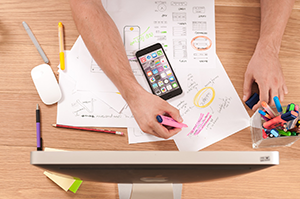 The shutdown caused by the coronavirus pandemic has meant that for the first time many of us experiencing challenges associated with accessing limited or highly desired goods and services, isolation and using technology for all communications. It has challenged our well-established ideas of what it means to be connected to family, friends and employment. And it has us now all questioning whether things can be done differently and perhaps, even better.
The shutdown caused by the coronavirus pandemic has meant that for the first time many of us experiencing challenges associated with accessing limited or highly desired goods and services, isolation and using technology for all communications. It has challenged our well-established ideas of what it means to be connected to family, friends and employment. And it has us now all questioning whether things can be done differently and perhaps, even better.
The last few months have shown how the need to thrive and survive has forced businesses and individuals to think outside the square and show their innovative and creative sides. Restaurants have not only had to switch to offering takeaway only but they have come up with new ways of ordering and providing contactless pick-up and delivery, as have pharmacies and even health practitioners had to re-think how they deliver their services. Education and entertainment are taking place in virtual classrooms and most workers are holding meetings and even conferences online with participants spread around the country and world. Families are celebrating special events while physically separated and entertainers are hosting collaborative concerts while in different states and even countries. We have all had to rethink the way we engage with things and each other – we have had to in many ways redesign the environment we are working and playing in.
We are a few months into this new normal and in the main we as a community we are managing to keep things going. A key question for us all is whether this experience will encourage business and individuals to return to the old ways of doing things or will some of these changes remain and continue to the benefit of the broad community. Is design that leads to easier access and engagement for everyone, including those with physical, mental and social disabilities, in fact good for business and potentially leads to better returns?
The idea of a better or different way to doing things to make access and use easier for everyone was the motivation behind the development of simple innovations that are now part of our everyday lives. Many of them we just take for granted and barely notice anymore. When was the last time you noticed a sidewalk ramp, or the smooth curb cut (that dip that lets you get your pram, trolley or wheelchair down the curb), doors that open automatically, taps with sensors or lever handles when you are in kitchen?
These improvements are part of a design process called Universal Design. The concept was developed by the architect Robert Mace in the 1970s and is about designing the environment and the products within that space to be aesthetically pleasing and useable to a greater extent by everyone, regardless of their age, ability or social status. The dropped curb was actually pioneered in the 1960s by Selwyn Goldsmith who authored the book Designing for the Disabled (1963), and was about provided free access for people with disabilities and is now a standard feature of the urban landscape around the world.
Pandemic aside, the considerations of increased life expectancy and an ageing population, better medicine leading to higher survival rates of people with significant injuries and illness have led to a growing interest in Universal Design. A world that is a better connected and operates in a more efficient and inclusive way is attractive to many in business, government and the community in general.
There are many industries in which Universal Design is having strong market penetration. Some of the obvious examples are construction, architecture and industrial and interior design. Others are in the early stages of understanding and applying the benefits of Universal Design including technology, education and training, services, and general use products. This idea also means that we need to look at innovation a bit differently – it’s not just about creating the next best thing with all the bells and whistles. It is also about the small innovations, looking at how we address a simple every day need in a more inclusive and accessible way.
Maybe the new normal will be the motivation more industries need to start looking in the benefits of conducting #CBRBusinessUnusual.



